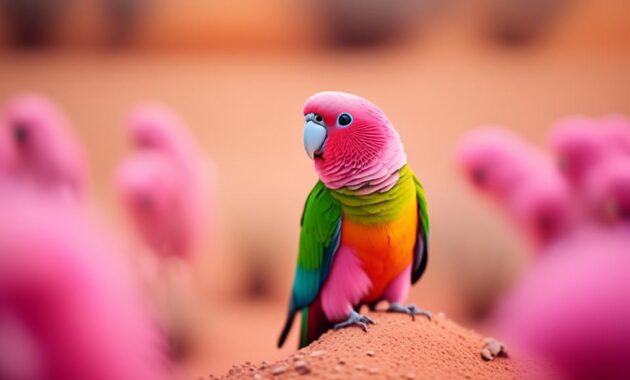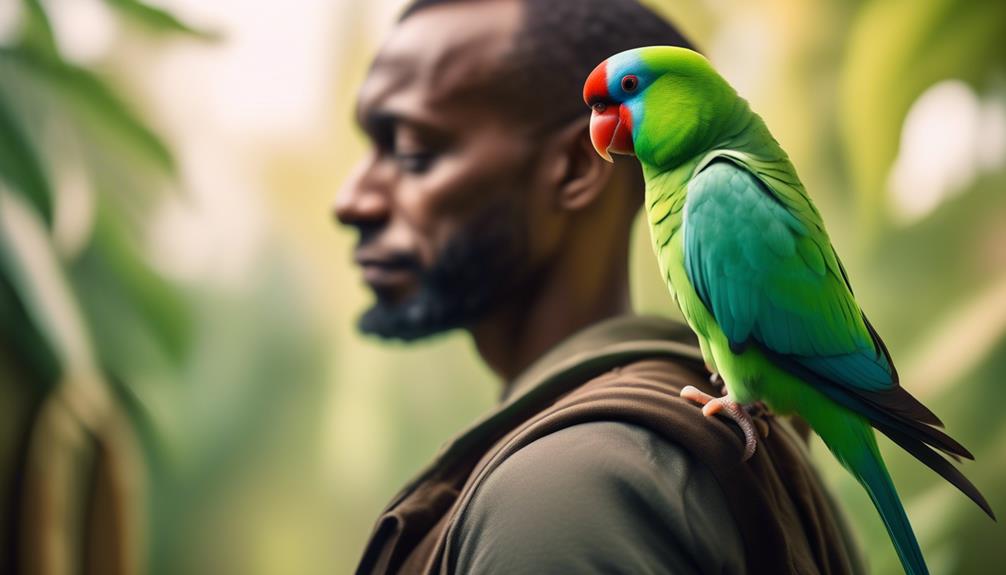
Are you searching for the perfect companion pet that combines stunning aesthetics with intelligence and adaptability? Look no further than the African Ringneck Parakeet.
These remarkable birds have captured the hearts of pet owners worldwide, thanks to their unique appearance and easy-going nature.
But what makes them such great companions? In this discussion, we will explore the various traits and characteristics that set the African Ringneck Parakeet apart, leaving you eager to discover why they thrive as cherished pets.
Key Takeaways
- African Ringneck Parakeets are popular pet parrots known for their unique appearance and personality traits.
- They are native to a narrow region in Africa but have also adapted well to urban areas and can be found in thriving populations worldwide.
- African Ringneck Parakeets are skilled talkers and mimics, making them best kept as house pets.
- Proper care and feeding, as well as social interaction, are crucial for their health and well-being as companion pets.
Size and Appearance
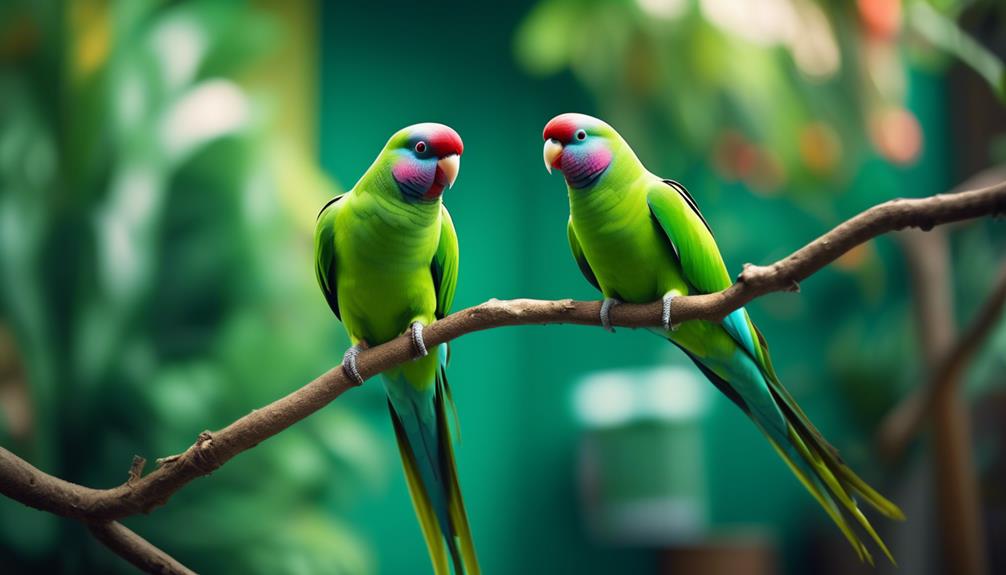
The African Ringneck Parakeet, known for its unique appearance and personality traits, is a popular pet parrot among bird enthusiasts. These parakeets have a slender build and a long tail, measuring an average length of around 16 inches (40 centimeters). They typically weigh a bit over 5 ounces (150 grams).
The African Ringneck Parakeet’s body is light green, with yellowish tones on the chest and belly. Males have black chin straps, a pink collar, and light blue shades on the cheeks. Their striking colors and sleek physique make them visually appealing to bird lovers.
With their distinct appearance, African Ringneck Parakeets stand out among other pet parrots.
Native Region and Habitat
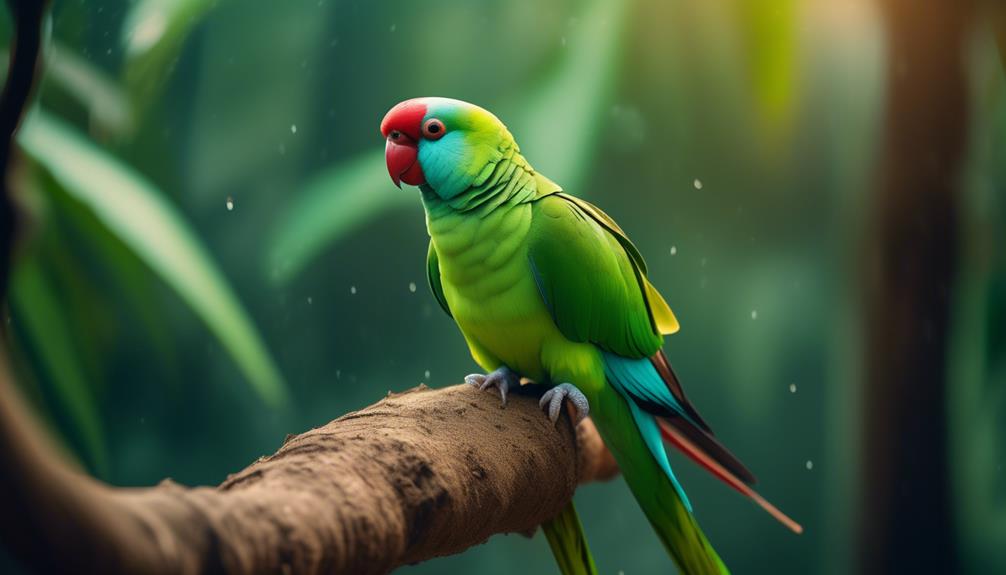
Where can African Ringneck Parakeets be found in their natural habitat? African Ringneck Parakeets are naturally found in a narrow region in Africa, including countries like Senegal, Mauritania, Guinea, Uganda, Somalia, and Ethiopia. They thrive in a variety of habitats, including the valleys of the Nile river and urban areas. Some populations have emerged from parrots that escaped from captivity. Their adaptability and durability are evident in these thriving populations. They are also commonly seen in some of the world’s biggest capitals.
| Native Region | Habitat |
|---|---|
| Senegal | Valleys of the Nile river |
| Mauritania | Urban areas |
| Guinea | |
| Uganda | |
| Somalia |
African Ringneck Parakeets have managed to adapt and establish themselves in different environments, showcasing their ability to thrive as companion pets.
Speech and Sounds
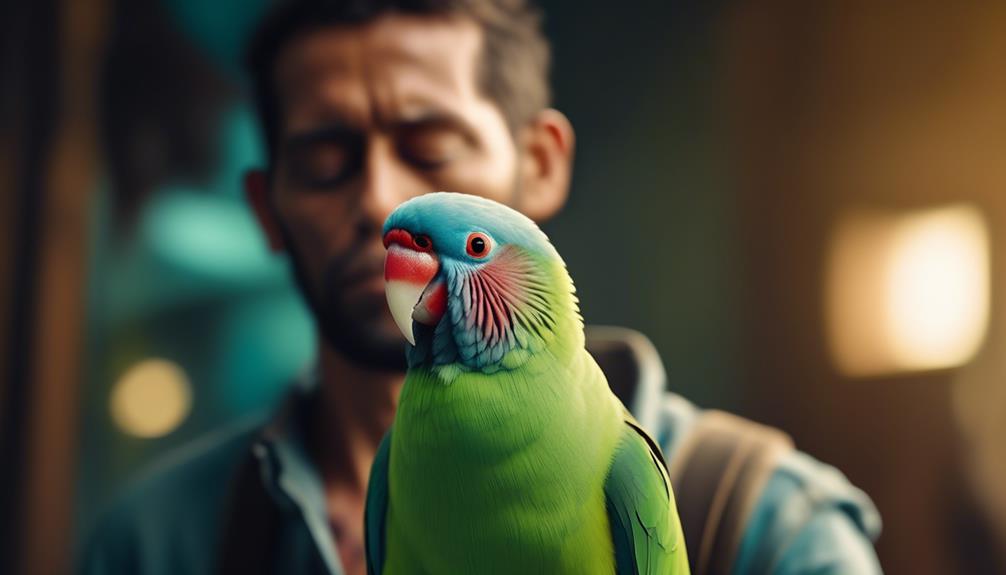
After establishing themselves in diverse habitats across Africa, African Ringneck Parakeets showcase their expressive nature through their speech and sounds.
- They aren’t overly noisy but love to express themselves vocally.
- They’ve moderately loud natural calls.
- They’re skilled talkers and decent mimics, capable of building a small vocabulary of repeated phrases.
- They can imitate common sounds like phones, alarms, and barking dogs.
- Due to their vocal abilities, they’re best kept as house pets.
African Ringneck Parakeets have the ability to communicate through various vocalizations, making them engaging and entertaining companions. Their natural calls aren’t excessively loud, making them suitable for indoor living. These parakeets have a knack for learning and can develop a repertoire of repeated phrases. They’re also adept at mimicking common sounds, adding a touch of amusement to their presence.
With proper training and socialization, African Ringneck Parakeets can become skilled talkers, bringing joy and laughter to their owners.
Care and Feeding

To ensure the well-being of African Ringneck Parakeets, proper care and feeding are essential.
Commercial seed mixes designed for parakeets provide a good foundation for their diet, containing seeds, millet, and sometimes nuts. However, their diet should be enriched with fresh fruits, green vegetables, and occasionally cooked rice or chicken.
It’s important to provide fresh drinking water daily, along with bathing dishes for hygiene purposes.
In addition to a nutritious diet, these parakeets require attention, care, and love from their owners. They’re social birds and need interaction to thrive.
Providing a suitable living environment is crucial for their health and well-being.
Health and Social Needs
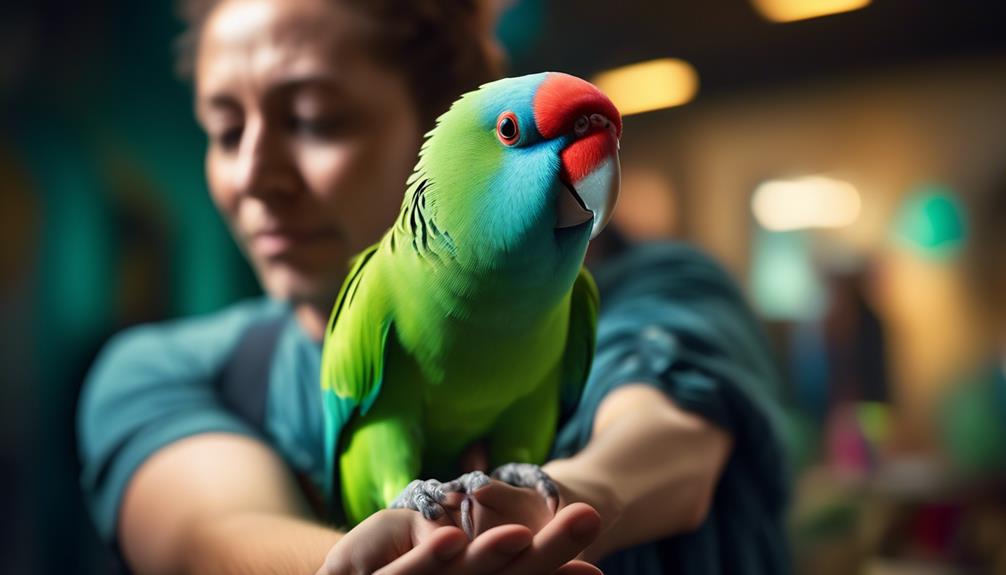
Proper care and attention to their health and social needs are crucial for African Ringneck Parakeets to thrive as companion pets.
Here are some key points to consider:
- Regular veterinary check-ups: Regular visits to the vet will ensure that any potential health issues are detected early and treated promptly.
- Balanced diet: Providing a well-balanced diet consisting of commercial seed mixes, fresh fruits, vegetables, and occasional cooked rice or chicken will support their overall health and vitality.
- Mental stimulation: African Ringneck Parakeets are intelligent birds and need mental stimulation to prevent boredom. Providing toys, puzzles, and interactive playtime will keep them happy and engaged.
- Exercise opportunities: These parakeets need ample exercise to maintain their physical well-being. Providing a spacious cage and allowing supervised out-of-cage time for flying and exploration is essential.
- Social interaction: African Ringneck Parakeets are social birds and thrive on interaction with their owners. Spending quality time with them, engaging in training sessions, and providing companionship will help them lead fulfilling lives.
Unique Personality Traits
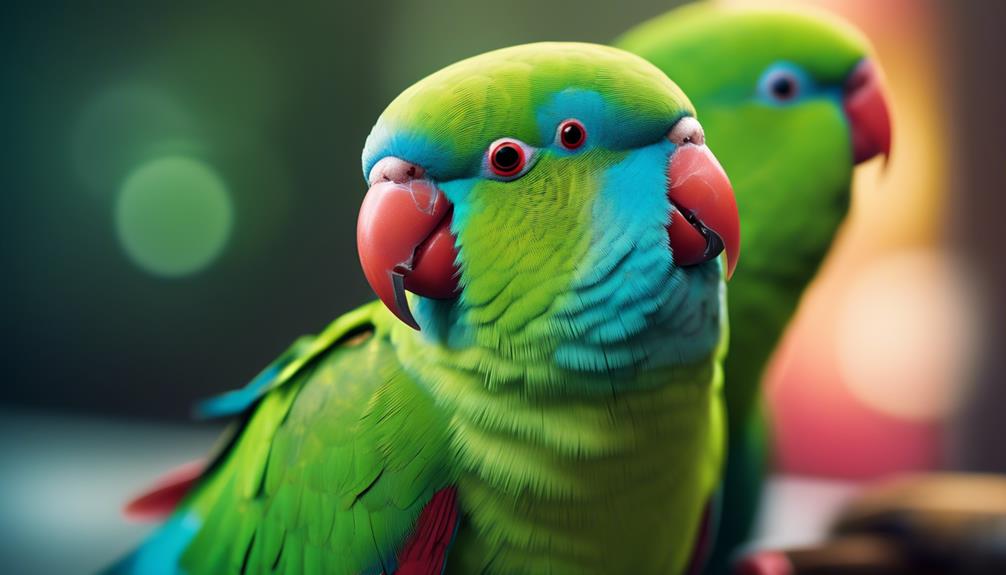
Regular veterinary check-ups and a balanced diet are essential for the health and well-being of African Ringneck Parakeets. These parakeets are known for their intelligence and adaptability, making them highly trainable and interactive pets. They have a curious nature and love to explore their surroundings, often using their beak and feet to investigate objects.
African Ringneck Parakeets are also known to be affectionate and form strong bonds with their owners. They enjoy being gently stroked and may even seek physical contact by snuggling against their owner’s neck or shoulder. With their playful and social nature, African Ringneck Parakeets make delightful companions for those willing to provide them with the attention and enrichment they need.
Training and Enrichment
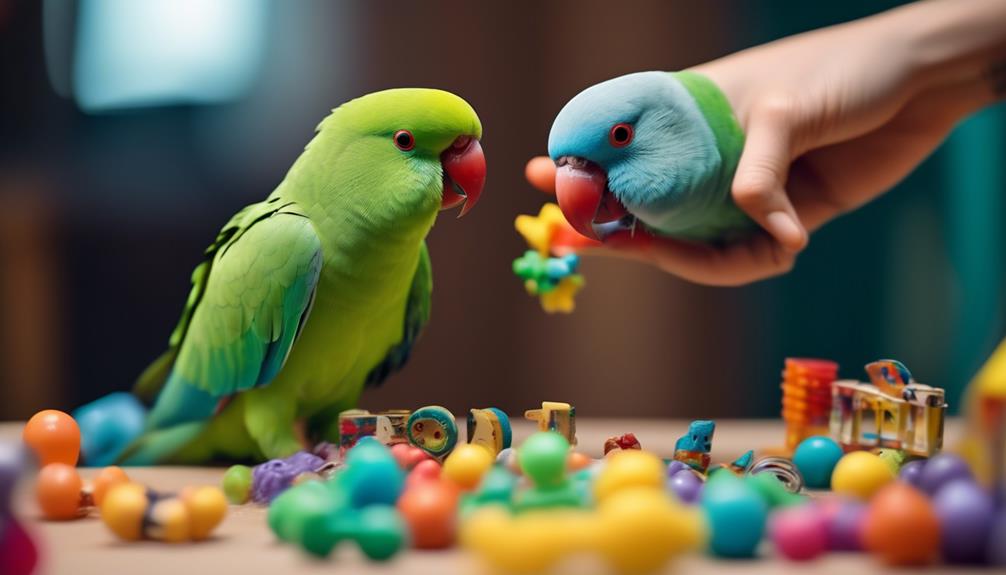
African Ringneck Parakeets thrive with interactive training and enrichment activities. These intelligent birds are eager learners and enjoy mental stimulation. Here are five ways to provide training and enrichment for African Ringneck Parakeets:
- Teach them simple tricks like stepping up on your hand or turning around.
- Use positive reinforcement, such as treats and praise, to reward good behavior.
- Provide a variety of toys, such as puzzle toys and foraging toys, to keep them entertained and engaged.
- Create an enriching environment by offering different perches, swings, and ladders for them to explore.
- Spend quality time interacting with your parakeet through socialization activities like talking, singing, and playing games.
Common Health Issues
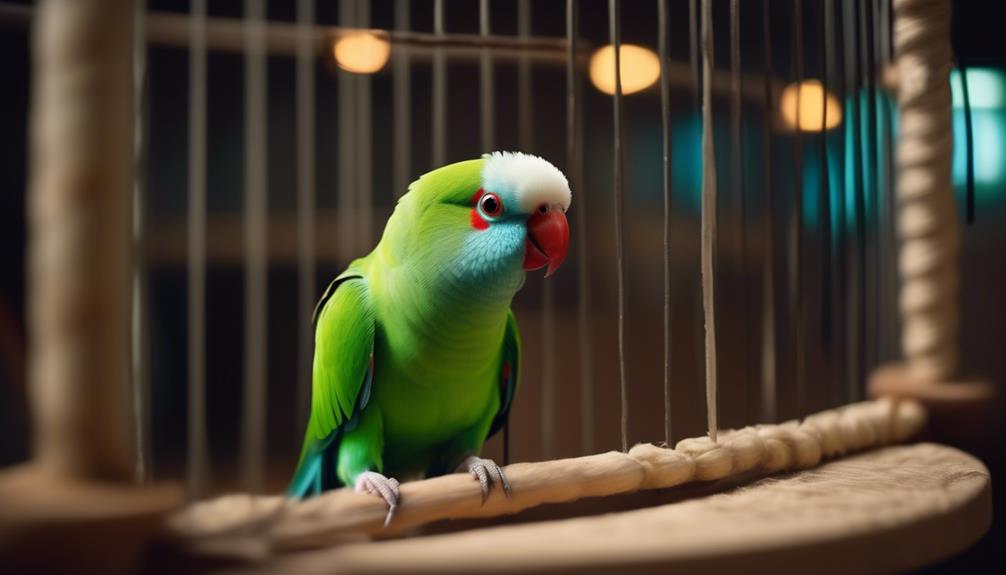
After providing training and enrichment activities for African Ringneck Parakeets, it is important to be aware of common health issues that may affect these intelligent birds. Despite their adaptability and hardiness, African Ringneck Parakeets are still susceptible to certain health problems. Here are some common health issues that owners should watch out for:
| Health Issue | Symptoms | Treatment |
|---|---|---|
| Feather plucking | Bald patches, irritated skin, excessive preening | Identifying and addressing the underlying cause, such as stress or boredom |
| Respiratory infections | Sneezing, coughing, wheezing, difficulty breathing | Antibiotics prescribed by a veterinarian |
| Psittacosis (parrot fever) | Lethargy, loss of appetite, difficulty breathing | Antibiotics and supportive care |
Regular check-ups with a avian veterinarian and maintaining a clean and stimulating environment can help prevent and address these health issues. Being proactive in monitoring their health ensures that African Ringneck Parakeets can live long and healthy lives as beloved companion pets.
Creating an Ideal Living Environment
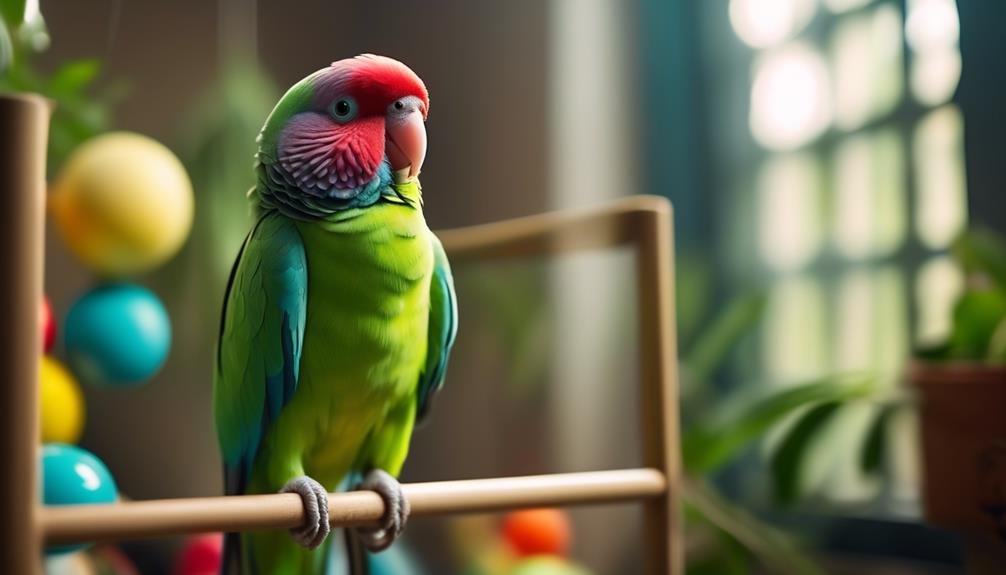
To provide the best care for African Ringneck Parakeets, it’s important to create an ideal living environment that meets their social and physical needs. Here are some key factors to consider:
- Cage size: Provide a spacious cage that allows the parakeet to stretch its wings and move around comfortably.
- Perches and toys: Offer a variety of perches and toys to keep them mentally stimulated and physically active.
- Proper lighting: Ensure they have access to natural light or provide full-spectrum lighting to mimic sunlight.
- Temperature and humidity: Maintain a temperature range of 65-85°F (18-29°C) and humidity levels around 40-70%.
- Social interaction: Spend quality time with your parakeet daily, engaging them in play and training sessions.
Bonding and Interaction
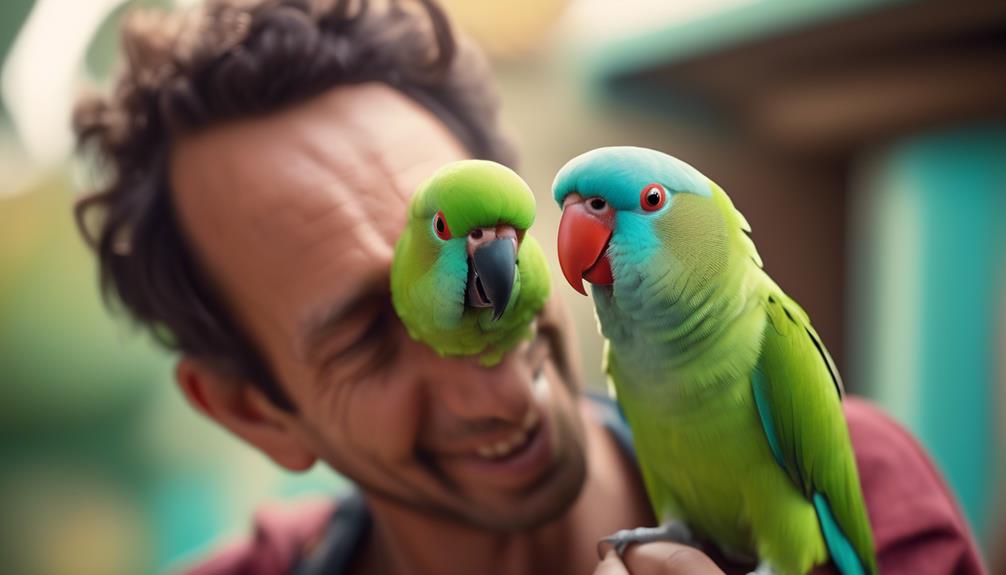
Creating a strong bond and promoting regular interaction is crucial for the well-being and happiness of African Ringneck Parakeets. These social birds thrive on companionship and enjoy spending time with their owners.
Bonding with an African Ringneck Parakeet can be achieved through daily interaction, such as talking to them, offering treats, and providing opportunities for play and exploration outside of their cage. Regular handling and gentle touch will also help build trust and strengthen the bond between the parakeet and its owner.
It’s important to remember that each parakeet has its own unique personality and preferences, so it’s essential to pay attention to their body language and adjust the interaction accordingly.
Suitability as a Family Pet
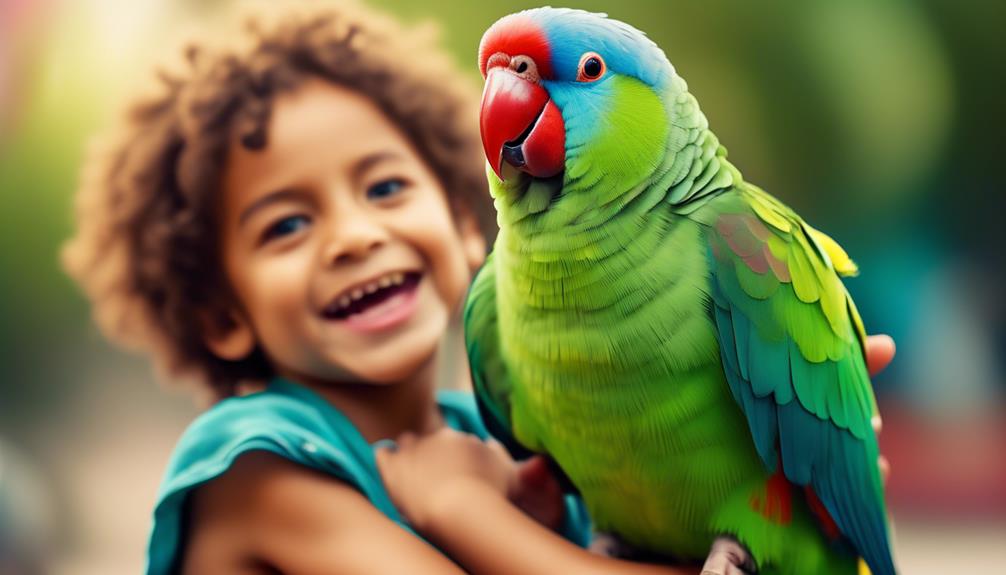
Building a strong bond and promoting regular interaction with African Ringneck Parakeets is crucial for their well-being and happiness, making them suitable as family pets. Here are five reasons why African Ringneck Parakeets are great for families:
- Social nature: African Ringneck Parakeets are highly social birds and thrive in a family environment where they can interact with their owners and be part of daily activities.
- Playful and entertaining: These parakeets have a playful nature and enjoy interacting with toys, puzzles, and their human companions, providing endless entertainment for the whole family.
- Ability to talk: African Ringneck Parakeets are skilled talkers and can develop a small vocabulary. Children will be delighted to hear their feathered friend mimic their words and sounds.
- Long lifespan: With proper care and attention, African Ringneck Parakeets can live for over 20 years, allowing them to grow and bond with the family over a long period of time.
- Educational experience: Owning an African Ringneck Parakeet can be a valuable learning experience for children, teaching them about responsibility, empathy, and the natural world.
Tips for Choosing an African Ringneck Parakeet
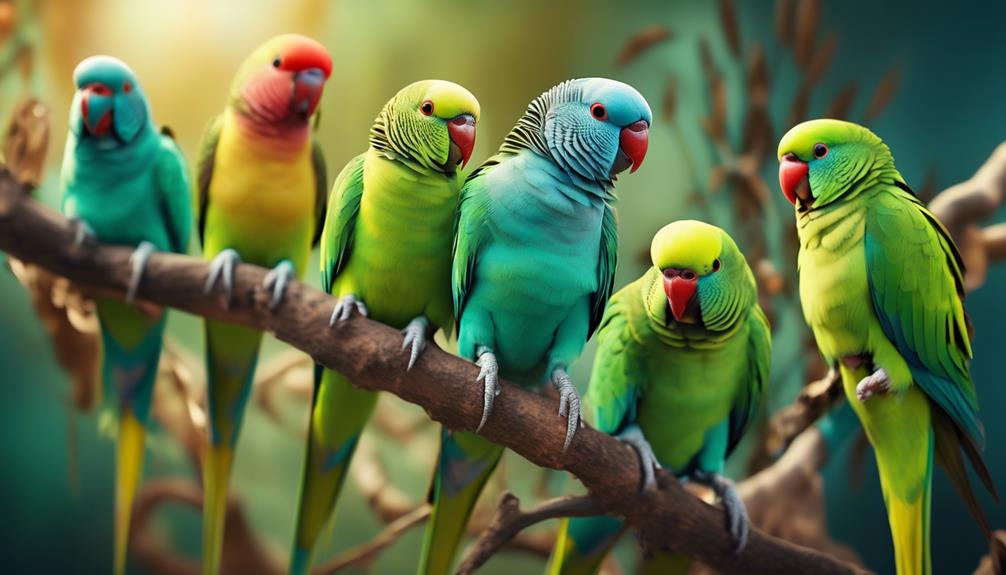
When selecting an African Ringneck Parakeet, it is important to consider specific factors to ensure a suitable and compatible companion. Here are some tips to help you make the right choice:
| Factor | Consideration |
|---|---|
| Personality | Observe the parakeet’s behavior and temperament. Look for signs of friendliness, curiosity, and adaptability. |
| Age | Decide whether you want a young or adult parakeet. Young birds can be trained more easily, while adult birds may already have established behaviors. |
| Gender | Determine if you prefer a male or female parakeet. Males are known for their talking abilities, while females tend to be quieter. |
| Health | Check for signs of good health, such as bright eyes, clean feathers, and active behavior. Avoid birds with signs of illness or injury. |
| Compatibility | Consider the bird’s compatibility with your lifestyle and living situation. Ensure you have enough time, space, and resources to provide proper care and attention. |
Frequently Asked Questions
What Are Some Unique Personality Traits of African Ringneck Parakeets?
African Ringneck Parakeets have unique personality traits. They are known for being vocal, talkative, and skilled mimics. They can imitate sounds like phones and barking dogs. Their adaptability and hardiness make them great companion pets.
What Are Some Common Health Issues That African Ringneck Parakeets May Face?
African Ringneck Parakeets may face common health issues such as respiratory problems, feather plucking, and beak and nail overgrowth. Regular veterinary check-ups, a balanced diet, and proper care can help prevent and address these issues.
How Can I Create an Ideal Living Environment for an African Ringneck Parakeet?
To create an ideal living environment for an African Ringneck Parakeet, provide a spacious cage with plenty of toys and perches. Offer a balanced diet, fresh water, and regular interaction. Maintain a comfortable temperature and ensure their safety and security.
What Are Some Tips for Bonding and Interacting With African Ringneck Parakeets?
To bond and interact with African Ringneck Parakeets, spend quality time with them daily, talking, playing, and providing toys for mental stimulation. Offer treats as rewards and be patient, as building trust takes time.
How Do I Choose the Right African Ringneck Parakeet for My Family?
To choose the right African Ringneck Parakeet for your family, consider factors such as the bird’s age, temperament, and compatibility with your lifestyle. It’s important to interact with the bird before making a decision and ensure proper care and commitment.
Are Regent Parakeets as Adaptable as African Ringneck Parakeets as Companion Pets?
Regent Parakeets are known for their adaptability as companion pets. However, when comparing them to African Ringneck Parakeets, it’s essential to explore the regent parakeets’ world to understand their unique needs and behaviors. With proper care and attention, both species can make loving and adaptable pets.
Conclusion
In conclusion, African Ringneck Parakeets are highly adaptable and make wonderful companion pets. With their unique appearance, vocal abilities, and social nature, they can bring joy to any household.
However, their large size requires commitment and proper care. By providing a suitable living environment and plenty of interaction, these parakeets can thrive and become cherished members of the family.
If you’re looking for a visually striking and intelligent pet, the African Ringneck Parakeet is a great choice.



